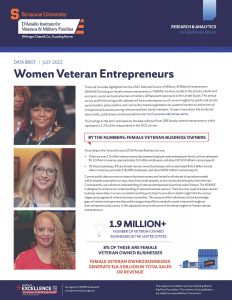This brief provides highlights from the 2021 National Survey of Military-Affiliated Entrepreneurs (NSMAE) focusing on female veteran entrepreneurs. NSMAE monitors trends in the activity, needs, and economic, social, and policy barriers of military-affiliated entrepreneurs in the United States. This annual survey and forthcoming public dataset will be an enduring source of current insights for public and private sector leaders, policymakers, and community-based organization on systemic barriers to and drivers of entrepreneurial success among veterans and their family members.
Read the accessible Word version of the data brief.
To learn more about this study and other briefs, publications, and presentations visit the NSMAE Series.
The findings in this brief are based on the data collected from 298 female veteran entrepreneurs, which represents 11.2% of the respondents in the 2021 survey.
A Few Key Takeaways
57 % of female veteran entrepreneur consider themselves as social entrepreneur

